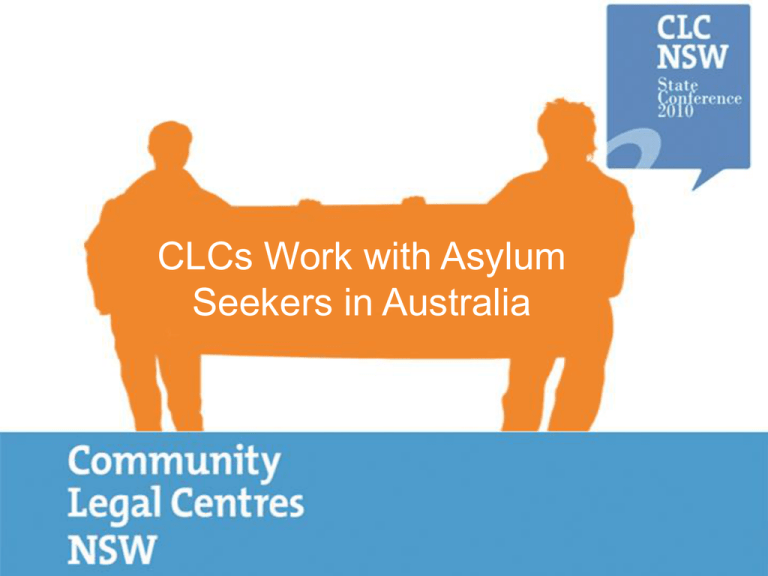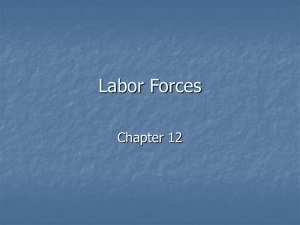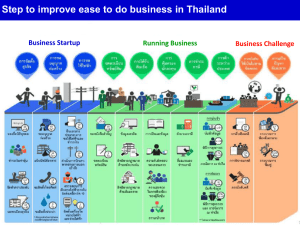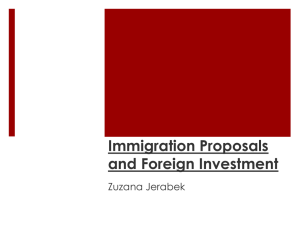to view RACS presentation - part 3
advertisement

CLCs Work with Asylum Seekers in Australia Criminal Law Family Law Housing Law /Homelessness Referrals The criminal law impacts on the success of a Protection visa application in two key ways: (1) Character (s501 Migration Act) (2) Joint asylum applications and domestic violence and/or relationship breakdown Decision of Minister or delegate--natural justice applies S501 (1) The Minister may refuse to grant a visa to a person if the person does not satisfy the Minister that the person passes the character test. (2) The Minister may cancel a visa that has been granted to a person if: (a) the Minister reasonably suspects that the person does not pass the character test; and : (b) the person does not satisfy the Minister that the person passes the character test. (6) For the purposes of this section, a person does not pass the character test if: (a) the person has a substantial criminal record (as defined by subsection (7)); or (b) the person has or has had an association with someone else, or with a group or organisation, whom the Minister reasonably suspects has been or is involved in criminal conduct; or (c) having regard to either or both of the following: (i) the person's past and present criminal conduct; (ii) the person's past and present general conduct; the person is not of good character; or (d) in the event the person were allowed to enter or to remain in Australia, there is a significant risk that the person would: (i) engage in criminal conduct in Australia; or (ii) harass, molest, intimidate or stalk another person in Australia; or (iii) vilify a segment of the Australian community; or (iv) incite discord in the Australian community or in a segment of that community; or (v) represent a danger to the Australian community or to a segment of that community, whether by way of being liable to become involved in activities that are disruptive to, or in violence threatening harm to, that community or segment, or in any other way. Otherwise, the person passes the character test . (7) For the purposes of the character test, a person has a substantial criminal record if: (a) the person has been sentenced to death; or (b) the person has been sentenced to imprisonment for life; or (c) the person has been sentenced to a term of imprisonment of 12 months or more; or (d) the person has been sentenced to 2 or more terms of imprisonment (whether on one or more occasions), where the total of those terms is 2 years or more; or (e) the person has been acquitted of an offence on the grounds of unsoundness of mind or insanity, and as a result the person has been detained in a facility or institution. In reaching a decision on whether to refuse or cancel a visa, a decision-maker needs to consider: (a) the nature of any harm that the person concerned may cause to the Australian community; and (b) the risk of that harm occurring ‘Harassment’, ‘molestation’ ‘intimidation’ and ‘stalking’ are to be given their ordinary meaning. Note: Section 501(11) of the Act clarifies the scope of conduct amounting to harassment or molestation. Conduct and behaviours that may fall under this category include, but are not limited to, the following: (a) conduct that could be construed as harassment or intimidation (whether or not it breaches the terms of an Apprehended or Domestic Violence (or similar) Order); (b) conduct that potentially places children in danger, such as unwelcome and/or inappropriate approaches, including, but not limited to, approaches made through electronic media; or (c) conduct that would reasonably cause an individual to be severely apprehensive, fearful, alarmed or distressed regarding the person’s behaviour or alleged behaviour towards the individual, or in relation to the property of that or any other individual. s501 Migration Act: Refusal to grant a visa or to cancel a visa on character grounds under s501 is a freestanding power that can be used in any circumstances, notwithstanding other powers in the Act. Where a person has a substantial criminal record as defined under s501(7), they do not pass the character test. There is no scope to take into account mitigating factors in order to find that they pass the character test. However, these factors may be taken into account when the delegate exercises the discretion to refuse or cancel the visa. The general principle is that any convictions that the person may have incurred at any time will be considered for the purposes of the character test. All convictions that the person has incurred will be considered for the purposes of the character test, regardless of how long ago or where the convictions may have occurred. Many asylum seekers and/or refugees are unaware of s501 provisions. It is imperative that a CLC client who is intending to apply for a Protection visa, or pending a DIAC/RRT decision, or even has been granted a visa, is advised of the impact of a plea on their application. As shown earlier, even a suspended sentence or a community service order can count as a substantial criminal record. Referral to a Migration Agent is a good idea! The two main areas of concern for asylum seekers: - Relationship breakdown - Family violence Under the Migration Act a Protection visa can will be awarded to either a person to whom Australia has protection obligations under the Convention or a member of the family unit of such a person, provided they satisfy the health and public interest criteria. A member of the family unit may be a spouse, a de facto or a child. They may or may not have individual protection claims. Persons who claim to be members of the family unit may lodge an application together, as a combined application. The applicant with the strongest claims is considered the ‘main applicant’. If the relationship breaks down, the secondary applicant needs to lodge a separate claim to refugee status. A client who is seeking advice regarding divorce and/or separation should be advised to get migration advice concerning the consequences of the decision to separate if they have a protection visa application pending. If the secondary applicant does not have any claims, he or she may not be entitled to continue to remain in Australia if the separation proceeds. Referral to a Migration Agent is a good idea! It may be that a client is in Australia and has lodged an application for a partner visa but, in the meantime his or her relationship breaks down be because of violence. The Family Violence Provisions of the Migration Act allow this individual to make an application for a permanent visa if the applicant can demonstrate that he or she is the victim of Family Violence and was in an ongoing relationship with an Australian citizen. These provisions are not available to applicants for a Protection visa. In such cases, the victim of family violence should, if a secondary applicant, inform the Department that the relationship has broken down and make a separate claim for Protection. If considering a client in this situation, it is important to also consider if they have been the victim of trafficking and thereby consider the possibility of a referral to the Anti-Slavery Project, run by the UTS. Asylum seekers awaiting the outcome of a Protection visa application are given a Bridging Visa. This will continue to apply throughout the appeal process. If they have been illegal anytime prior to applying for a Protection visa they will be given a Bridging Visa E (“BVE”) which will mean they have no work rights. Asylum seekers on a BVE are entitled to apply for a right to work if they can establish a ‘compelling need to work’ and provide a reasonable explanation for the delay in applying for a PV. This is a simple procedure that can be completed at a RACS evening advice session. Asylum seekers on any BV do not have access to welfare. They may, however, have access to Medicare. As a result, a number of Asylum seekers may become homeless or be increasingly indebted. It is important to recognise that a number of refugees will only assist Australian residents. The Red Cross and the Asylum Seekers Centre are very helpful referral centres in this regard.



